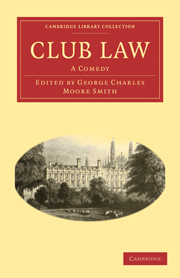INTRODUCTION
Published online by Cambridge University Press: 07 September 2010
Summary
I. Fuller in his History of the University of Cambridge (1655) gives an amusing account of the production of a play called Club Law at Clare Hall in one of the last years of the 16th century. The play, we are told, which was written in English, was ‘ merry (but abusive),’ being intended by the young scholars who composed it as a piece of revenge on the townsmen of Cambridge by whom they considered themselves wronged. Individual members of the corporation were personated to the life with their characteristic gestures and expressions, and, though many of the incidents of the play were imaginary, some came ‘ too near to truth’ to be pleasant to the persons travestied, who had been invited to the performance and were constrained by their hosts to see it out.
It is not clear that Fuller had ever read the play, and I am not aware of any other reference to it in the 17th century.
In the 18th century we hear of a supposed manuscript of the play (without a title) which was in the possession of Dr Richard Farmer, Master of Emmanuel. In the Catalogue of Dr Farmer's library, issued previous to its sale in May, 1798, we have the following entries:
‘7441 The famous Tragedie of King Charles I. imperfect.
Ditto 1649.
7441 Club-Law, a merry but abusive Comedy, MS. Acted at Clare-Hall 1597—8'
The two items, according to two priced catalogues which I have seen, were sold together for five shillings.
- Type
- Chapter
- Information
- Club LawA Comedy, pp. ix - lviPublisher: Cambridge University PressPrint publication year: 2009First published in: 1907



